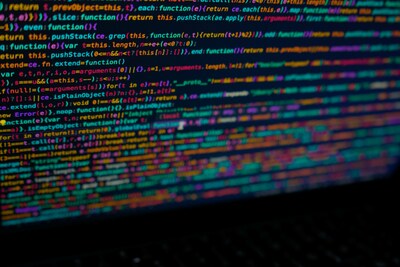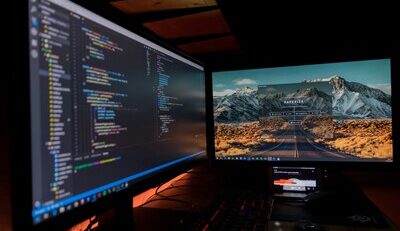Choosing a programming language at the beginning presents a difficult decision for many people. Despite its importance early on, it often becomes a barrier to taking the first steps in learning programming. This is paradoxical – on one hand, we want to understand what we want to learn and why, so we seek information, delve into the subject, and ask questions. But on the other hand, we spend too much time on this. Instead of starting to learn, instead of starting to write code, we still sit and wonder which language to use. That’s why we’ve decided to make this task easier for you. We encourage you to read the article where we suggest which programming language to choose.
Does the choice of language matter?
It doesn’t matter what programming language you choose at the beginning of your learning. However, we should clarify this point of view, because some of you may feel confused. How is it possible that you can start with any programming language? And if you can indeed choose any language, which one should you choose?
The view that the first choice of programming language doesn’t matter comes from the fact that most programming languages are based on similar principles. All programming languages have variables, constants, conditional statements, loops, functions, etc. – the basics are almost identical. Universal programming concepts are present in every language. So it doesn’t make much difference whether you learn these concepts in Java and then program in Python, or vice versa.
Programming languages – similar to each other
We can learn the basics of any language, regardless of our choice. Regardless of the language in which we start our programming adventure, we will understand almost all the concepts necessary in this field. If we later choose another language, many things will be easier, because we will perform the same tasks we have already done before, only in a slightly different way, using a slightly different syntax.
A programmer knows more than just one language
The issue of monolingualism in a programming environment is rare. Over the course of his career, a programmer usually uses a wide variety of languages. Each of them has its own specific applications and is used to solve specific problems, so we cannot limit ourselves to only one language and stand in one place.
Nevertheless, there is a certain moment when we have to make a decision – to choose that first language on which we will focus our attention and which will serve as a starting point. This brings up the question: which language should be the first one? There is no definite answer to this question, but we will, of course, share with you our recommendations and discuss the most popular programming languages.
It is worth learning the basics of several languages
We should not focus solely on one programming language, instead we should learn the basics of several different languages. When we gain knowledge of several languages, our approach to thinking will change, we will gain a broader perspective on programming and thus be less surprised. Being tied to one language can limit us, locking us into a certain segment of programming, whereas it is worthwhile to see programming as a broader discipline.
Therefore, when we are facing the choice of our first programming language, we recommend not to think that this one language will be our only language. If we choose a certain language, it does not mean that for the next year we will code only in that language. Instead, we encourage experimentation – we should spend 2-3 months writing in one language, and then repeat the same concepts in another language. This is what will broaden our perspective, which is crucial in a programmer’s job.
What is actually the first programming language?
It is equally important that we interpret the idea of a “first language” carefully. Does this “first language” mean the one in which we initially begin our programming adventure, discovering basic concepts like variables, conditional instructions, loops, or is it the language whose knowledge will get us our first jobs? This is a crucial question, as it greatly determines what we will learn and in what order.
Is Python a good language to start with?
Many experts will agree that Python is an ideal choice for novice programmers because of its simple and understandable syntax. Indeed, many newcomers quickly pick up Python and start creating their first programs. But is Python a good choice when it comes to looking for a first job? Here our conviction is no longer so strong. This is because Python is most often used in industries such as data science, machine learning and artificial intelligence. These fields tend to be advanced and are not for novice programmers.
In which languages are there the most jobs for junior programmers?
When we consider the projects where young programmers are most often involved, we find that the most commonly used technologies are Java, C# or JavaScript. Python is not as widely used, at least not as much as we would expect. That being said, knowledge of Python can be a huge asset when looking for your first job, as Python is often used to create scripts or automate various tasks. However, we should also master another language – like the aforementioned Java, C# or JavaScript.
If we are going to start our first job in IT, knowing Java or JavaScript well gives us a better chance of getting hired than knowing Python. There are simply more offers for entry-level Java programmers or frontend developers who know JavaScript than for those who specialize in Python.
Choose a simple language to start with!
When studying computer science, it’s common to take the first steps in C and C++ languages. Does this make them ideal choices for starting to learn programming? Not necessarily. In the context of academic education, it’s important to understand that studying computer science is not the same as taking a programming course. We start with C or C++ because they allow us to explore the foundations of computer science, to understand the structure of programming languages. That’s why we start with C, to understand key concepts such as pointers and memory allocation. In languages such as Java or C#, many processes have been automated, which means that by programming in them, we will not learn certain aspects that have already been programmed for us by the developers of the language.
For those who are learning programming on their own, I would suggest starting with a language that has a simple syntax and is easy to learn, such as Python, Java, JavaScript, or C#. PHP (it’s a very friendly language to work with) or Ruby can also be excellent choices.
Frontend or backend?
We need to think carefully about whether we start with a frontend or backend design. The frontend, simply put, are the elements that are visible to us on the website, the design of which is the responsibility of the frontend developer. The backend, on the other hand, are the mechanisms that run in the background – logging into the site, editing an account or adding posts and photos.
Working with the frontend is attractive because we can immediately see the results of our work. When we add a button display function to the code, the button becomes visible when the page is refreshed. When we add changing the background when the button is pressed – we refresh the page, press the button and the background changes. This can motivate you to continue learning and experimenting.
On the other hand, working with the backend, we need to be more imaginative, because we will not be accompanied by any “fireworks”, not everything will be immediately visible. If we implement a function to add something to the database, we have to go into the database and see “ok, we added a new user, it’s here in this row”. There is no room for automatic, immediate feedback on our work. This requires us to be more patient.
However, there will be people who are not interested in the frontend and want to work with the backend right away. They won’t mind the lack of “graphical fireworks” and will do everything in the console.
The best programming language to start with
When choosing a programming language, I recommend looking for one with an easy-to-understand syntax, experiment with it, and don’t limit yourself to one. Work with it for a few months, then test another, and then another. Programming is, after all, a never-ending adventure. When you choose a language, you are not making a decision for life – today’s choice doesn’t have to be unchanged a year from now, you can always adapt it. So my suggestions are Python, Java, JavaScript, C#, PHP – choose what you think is most suitable, and it will definitely be a good choice.
How to learn programming?
Effectively mastering programming requires a strategic approach. The first steps can be challenging, so maintaining interest and a positive attitude is key. In our opinion, it’s most effective to combine basic learning with the implementation of projects using tutorials, as I mentioned in an earlier article. This ensures that on the one hand we will build a strong theoretical foundation, and on the other hand we will quickly see encouraging results that will motivate us to continue.



